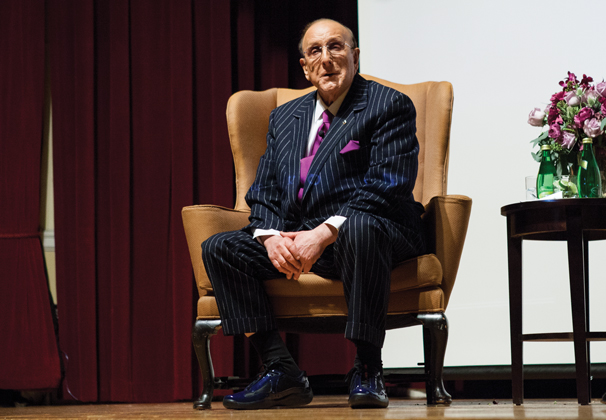
It is hard to imagine that Clive Davis, an award-winning record producer with five Grammy awards under his belt and the man with the golden ears, was not always aware of his affinity for music.
“I was an ordinary listener of music,” Davis said. “It was not anything [that seemed to] take over my life.”
Now, 40 years later, he has not only established himself as the sole recording producer in the Rock and Roll Hall of Fame, but the founder of a pioneering program for recording artists at NYU.
While working at the law firm Rosenman and Colin in New York after graduating from NYU’s College of Arts and Science and Harvard Law School in the 1950s, Davis was offered the assistant counsel position at Columbia Records and eventually became president in 1966. Only then, in the musical revolution of the ’60s, did he discover his gift for music.
After the musical talents of Janis Joplin caught his attention at the Monterey Pop Festival in California in 1967, Davis went on to sign artists like Bruce Springsteen, Whitney Houston and Alicia Keys.
Yet Davis’ contribution to the music industry encompasses more than signing artists to record labels. He noticed that no program offered students simultaneous training in business, performance, history and criticism of recorded music. According to Mary Schmidt Campbell, dean of the Tisch School of the Arts, Davis recognized that gap in music education. He set out to create the blueprint of the Clive Davis program. Within months of establishing the institute, Tisch formed a partnership with Davis to jump-start the Clive Davis Institute of Recorded Music.
Campbell said that Davis was meticulous in researching the cornerstones of the program.
“He is exacting,” she said. “We collected some catalogs of some music schools and he said, ‘We ought to look at everything.’ He wanted to do the deep-dive research. It’s fantastic to work with somebody who is driving you towards absolute excellence.”
The program was formally established in 2003.
“He said that film has always been regarded as one of the leading art forms of the 20th century, but [that] in fact more people listen to recorded music than watch film,” Campbell said of Davis.
Davis came to the university expressing interest in creating an academic program.
“Recorded music is every bit as influential in our culture, but [it] didn’t receive anywhere near the scholarly investigation,” Campbell said.
Tisch’s location was what drove Davis to develop a new program.
“New York City is still, to me, the creative capital center of the world and the hot spot center for media and communication all over the world,” Davis said. “The Tisch School of the Arts is so unique and special. It’s housed every kind of objective of the development of those who want to study somewhere in the arts.”
When a group of students from the institute recorded their cover of Rihanna’s “Diamonds” last December as part of a contest by Universal Music, Davis was listening.
“I’m very proud of what the students have done,” Davis said. “To see the growth of the school, the quality of the students, the seriousness of their work, […] the interest in the institute around the world is very heartwarming,” he said.
Since the establishment of the program, Davis has helped build the institute’s faculty. He was instrumental in bringing in record producer Swizz Beatz, who served as producer-in-residence in the institute from 2010 to 2011. More recently, he took part in a moderated Q&A discussion with Billboard’s editorial director Bill Werde at NYU’s Tishman Auditorium last Thursday to speak about his life and his new autobiography, “The Soundtrack of My Life.”
Jeffrey Rabhan, chairman of the recorded music program who previously managed acts at Sony BMG while Davis was chairman of the label, was grateful for Clive’s ability to help establish them in the music industry.
“He’s been an amazing supporter and a great mentor in many ways,” Rabhan said. “He has really served as a conduit for us and to the industry as a whole.”
While Davis has been consistently generous, helping aspiring students both inside and outside of NYU, he is a reminder that success ultimately lies in an artist’s own hands.
“My best advice [for students] is what I’ve done myself, is to work hard, is to study hard, is to be prepared, is to not take anything for granted,” Davis said. “Perfect your craft, whatever it is, and be the most prepared for whatever your mission, goal or responsibility is. It’s the way that people move on and succeed and fulfill their dreams.”
A version of this article was published in the Monday, Feb. 25 print edition. Nicole Del Mauro is a contributing writer. Email her at [email protected].

























































































































































